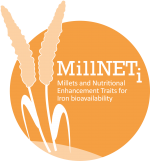MillNETi
MillNETi (Millets and Nutritional Enhancement Traits for Iron bioavailability) is a UKRI GCRF programme that seeks to improve iron nutrition status of people living in Ethiopia and The Gambia by investigating the bioavailability of iron in both biofortified millet and food prepared from biotfortified millet. The programme brings together a large multidisciplinary team of experts from the fields of crop genetics, nutrition, social science and knowledge exchange from the UK, Africa and India. Collaborating partners are: The University of Cambridge (Departments of Plant Sciences, Development Studies, MRC Bone Health group, the Global Food Security IRC, the Cambridge Global Challenges SRI and Cambridge-Africa), the Centre for Global Equality, NIAB, NIAB Innovation Farm, King's College London, and Rothamsted Research, MRC Unit The Gambia at LSHTM, Bahir Dar University (Ethiopia), ICRISAT (India, Ethiopia, Malawi) and works closely with partners in Ethiopia (JeCCDO) and HarvestPlus (India).
MillNETi is working across four Flagship Projects (FP):
FP1: GROWTH, it is looking at the genetic basis for biofortification traits, and assessing how the biofortified pearl millet varieties perform in different field conditions.
FP2 & FP3 (BIOAVAILABILITY and PROCESSING, respectively) is assessing the availability of natural iron by testing and validating different meal preparations based on traditional recipes, thereby identifying cooking methods which result in the most bioavailable iron. Social scientists in FP3 will use quantitative and qualitative surveys to understand how millets are currently grown, processed, cooked and consumed in focus villages in The Gambia and Ethiopia.
FP4: EXTENSION is working with local communities in Ethiopia and The Gambia to disseminate the knowledge generated by the project. In Ethiopia MillNETi is working closely with JeCCDo to build capacity through community-based organisations. Discussions of the nutritional benefits of millets and optimal preparation methods of biofortified millet will be facilitated in both Ethiopia and The Gambia. Cambridge-Africa will be supporting activities to meet the research capacity strengthening and knowledge transfer objectives within FP4.
Read more: A blog from Joanna Wolstenholme, MillNETi Programme Manager
Missives from MillNETi: Interdisciplinary working to tackle iron deficiency


